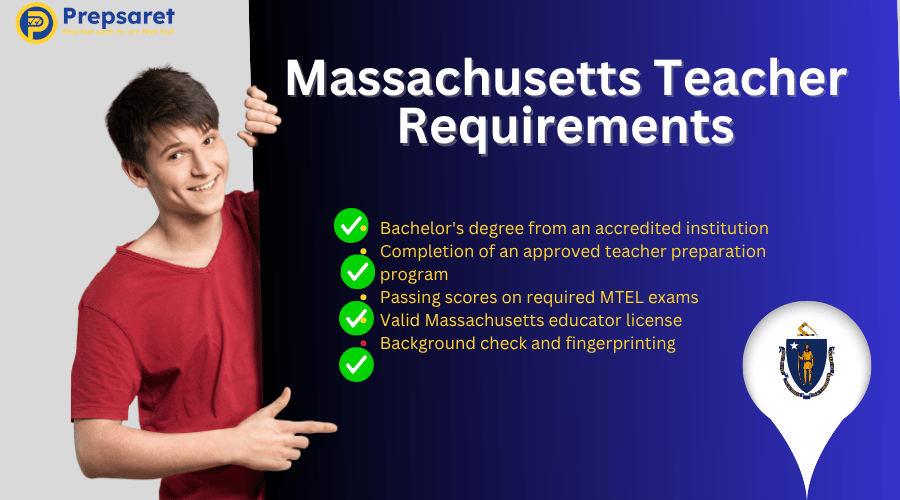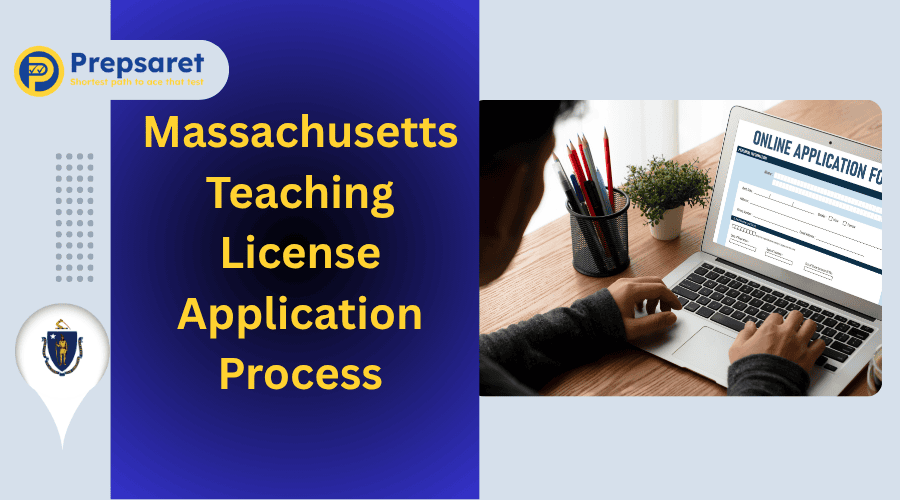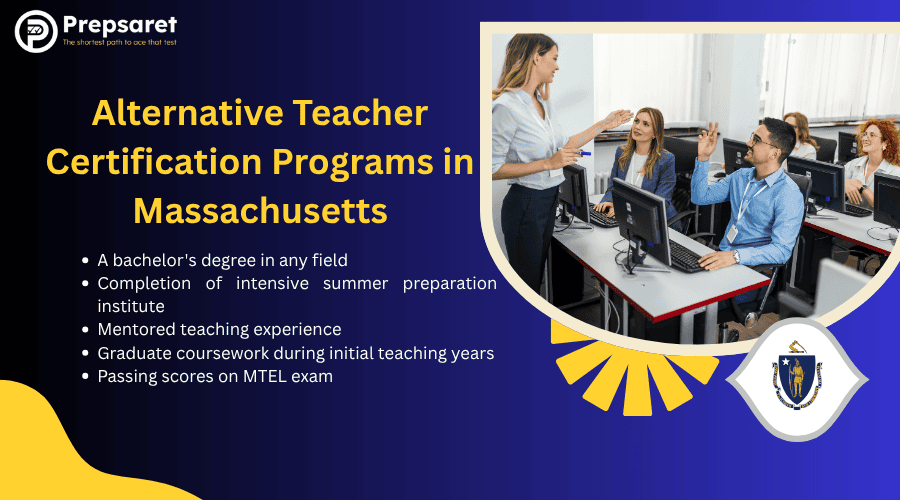Pursuing a teaching career in the Bay State requires navigating specific requirements and processes. This comprehensive guide outlines the essential steps to become a teacher in Massachusetts, from initial preparation through licensure.
Whether you’re a recent graduate or career-changer, understanding Massachusetts’ educator pathways is crucial for success. At Prepsaret, we provide the most accurate prep materials to help you ace your certification exams and launch your teaching career.
Massachusetts Teacher Requirements
Before embarking on your teaching journey, it’s essential to understand the fundamental Massachusetts teacher requirements that govern the profession. The state has established comprehensive standards to ensure all educators meet high-quality benchmarks.
Core Requirements for Massachusetts Educators
Public school teacher requirements Massachusetts include several key components:
- Bachelor’s degree from an accredited institution
- Completion of an approved teacher preparation program
- Passing scores on required MTEL exams
- Valid Massachusetts educator license
- Background check and fingerprinting
The Massachusetts educator license serves as your official credential to teach in public schools throughout the state. This license demonstrates that you’ve met all necessary qualifications and are authorized to educate students in your designated subject area and grade level.
Grade-Level and Subject-Specific Requirements
Different teaching positions have varying requirements. Elementary teachers need broad content knowledge, while secondary educators must demonstrate subject-specific expertise. How to become a high school teacher in Massachusetts involves additional subject-area testing and often requires deeper content knowledge in your chosen field.
Step-by-Step Guide to Becoming a Teacher in Massachusetts
This detailed step-by-step guide to becoming a teacher in Massachusetts breaks down the process into manageable phases, making your path to certification clearer and more achievable.
Phase 1: Educational Foundation (Years 1-4)
The journey begins with earning a bachelor’s degree, typically a four-year program that provides both general and subject-specific knowledge. Most programs include:
- General education requirements
- A content area specialization (such as math, science, or English)
- Courses in education theory, pedagogy, and instructional strategies
- Early field experiences and classroom observations
Phase 2: Teacher Preparation During your Degree
Alongside your degree, you’ll complete an approved teacher preparation program Massachusetts. These programs combine coursework with hands-on teaching practice, ensuring you’re ready for classroom responsibilities.
Phase 3: Testing and Licensure Application
After completing your preparation program, the next step is to take the required MTEL exam (Massachusetts Tests for Educator Licensure). Passing these assessments allows you to apply for your initial license.
This is the stage where you submit your official Massachusetts teaching license application, including transcripts, test scores, and background checks.
Phase 4: Employment and Professional Growth
Once licensed, you can seek teaching positions and begin your professional career. How to become a teacher in Massachusetts involves continuous learning and license renewal to maintain your credentials.
Teacher Preparation Programs in Massachusetts
Teacher preparation programs in Massachusetts are offered by various colleges and universities throughout the state. These programs are carefully designed to meet state standards and prepare future educators for classroom success.
Traditional Four-Year Massachusetts Teacher Preparation Programs
Most candidates complete a traditional teacher preparation program Massachusetts institutions offer as part of their undergraduate education. These programs typically include:
- Education coursework covering child development, learning theories, and teaching methods
- Content area studies in your chosen subject
- Supervised student teaching experiences
- Portfolio development and assessment
Alternative Teacher Preparation Options in Massachusetts
Wondering how to become a teacher in MA without an education degree? Not everyone follows a traditional route, and thus, several pathways to teaching Massachusetts exist. These alternative routes accommodate career-changers and professionals from other fields who want to transition into education.
Career-changers can pursue master’s degree programs specifically designed for those with bachelor’s degrees in other fields. These intensive programs compress traditional preparation into accelerated formats while maintaining rigorous standards.
Massachusetts Educator Testing (MTEL Exam)
The MTEL exam (Massachusetts Tests for Educator Licensure) represents a crucial milestone in your teaching journey. These comprehensive assessments evaluate your knowledge and skills in both general teaching competencies and subject-specific content.
Essential Components of Successful Teacher Preparation
The MTEL system is made up of several test categories designed for different teaching levels and specialties:
- Communication and Literacy Skills test (required for all candidates)
- General Curriculum test (for elementary educators)
- Subject-specific tests (for secondary and specialist educators)
- Additional tests for specific endorsements
How to Prepare for MTEL Success in Massachusetts
How to pass the MTEL exam in Massachusetts requires dedicated preparation and strategic study approaches. The exams cover extensive content areas and require both theoretical knowledge and practical application skills.
Understanding the test format, content areas, and scoring methods significantly improves your chances of success.
Practice tests, study guides, and preparation courses help candidates familiarize themselves with exam expectations and identify areas needing additional focus.
Massachusetts Teaching License Application Process
The Massachusetts teaching license application process involves multiple steps and careful attention to detail. Understanding each component ensures smooth processing and timely license issuance.
Required Application Documents and Materials
Your application package must include:
- Completed online application form
- Official transcripts from all institutions attended
- Verification of program completion
- MTEL score reports
- Background check results
- Application fees
Submitting accurate and complete documentation is essential for timely license issuance.
Types and Classifications of Massachusetts Teaching Licenses
Massachusetts offers several types of educator licenses depending on your level of preparation and teaching experience. Understanding the difference between a provisional vs professional license Massachusetts is critical for planning your career:
- Provisional License – issued to new teachers who have met initial education and testing requirements but lack full classroom experience.
- Professional License – awarded to experienced teachers who have fulfilled additional requirements such as advanced coursework, continuing education, or years of teaching service
How to Verify and Maintain Your Teaching License
The MA teacher license lookup system allows you to verify license status and track renewal requirements. Regular license renewals ensure continued authorization to teach and demonstrate your commitment to professional growth.
Applying as an Out-of-State Teacher in Massachusetts
The state also provides pathways for educators moving from other regions. Requirements for out-of-state teachers in Massachusetts often involve credential review and, in some cases, additional coursework or exams.
Additional Requirements for Out-of-State Certification
The out-of-state teacher certification transfer Massachusetts process typically requires candidates to:
- Submit transcripts for evaluation
- Take any required MTEL exams not completed previously
- Meet any additional preparation requirements
- Complete background check processes
Alternative Teacher Certification Programs in Massachusetts
Alternative teacher certification Massachusetts programs provide non-traditional pathways for individuals who didn’t complete traditional teacher preparation during their undergraduate studies.
Program Structure and Key Requirements
Alternative teaching certification Massachusetts requirements typically include:
- A bachelor’s degree in any field
- Completion of intensive summer preparation institute
- Mentored teaching experience
- Graduate coursework during initial teaching years
- Passing scores on MTEL exam
This pathway ensures candidates gain both the theoretical background and practical experience needed for effective instruction.
Flexibility and Options for Career Changers in Massachusetts
These programs are designed with career changers in mind. They recognize that strong educators often come from diverse professional fields. As a result, how to become a teacher in Massachusetts without a traditional education degree is entirely possible through these alternative routes.
Candidates can begin teaching while simultaneously completing coursework and mentoring requirements.
Professional Support and Mentorship Networks
Alternative pathways to teaching Massachusetts include strong support structures, such as:
- Experienced mentor teachers
- University partnerships for graduate credit
- Professional development workshops
- Peer collaboration networks
In addition to formal support, many prospective teachers seek informal insights online. For example, how to become a teacher in Massachusetts reddit discussions often feature practical tips from current educators and recent program graduates.
While these conversations can be helpful, official state and university resources should always serve as the primary guide.
Can I Teach in Massachusetts Without a Teaching Degree?
You cannot teach in public schools without proper licensure. However, alternative certification programs allow qualified candidates to begin teaching while completing the required coursework and exams.
Massachusetts Department of Elementary and Secondary Education (DESE) Role
The Massachusetts Department of Elementary and Secondary Education (DESE) serves as the state’s primary education oversight body, establishing policies, standards, and procedures that govern all aspects of public education.
DESE Responsibilities and Functions for Massachusetts Teachers
The department manages a wide range of critical functions, including:
- Teacher licensing and certification standards
- Curriculum frameworks and assessment policies
- School district oversight and support
- Professional development requirements
- Education policy implementation
Resources and Support for Educators in Massachusetts
DESE also provides extensive resources for current and aspiring educators. Their website offers:
- Step-by-step guides for the Massachusetts teaching license application process
- Updates on policy changes that affect classrooms and instruction
- Professional development and renewal opportunities
- Guidance on pathways, including alternative teacher certification Massachusetts options
For anyone exploring how to become a teacher in Massachusetts, DESE serves as the official and most reliable source of information.
Teacher Career Outlook in Massachusetts
Understanding the job market is an important part of planning your future in education. Teaching jobs in Massachusetts are available across a wide range of school districts, each offering unique opportunities and challenges.
Factors Affecting Teacher Salaries in Massachusetts
Teacher salary Massachusetts varies significantly based on factors including:
- Geographic location
- Experience level
- Education credentials
- District size and demographics
The Massachusetts teacher salary typically ranges from approximately $45,000 for beginning teachers to over $85,000 for experienced educators with advanced degrees.
Urban districts and wealthy suburban communities often offer higher compensation packages.
Professional Growth and Continuing Education for MA Teachers
Continuing education for Massachusetts teachers is not only required for license renewal but also plays a key role in professional growth. Educators can expand their skills and advance their careers through:
- Graduate programs in education or specialized content areas
- Advanced certifications and endorsements
- Professional learning communities and workshops
- Leadership development or administrative training
These opportunities help teachers move from a provisional to a professional license while opening doors to leadership roles.
Massachusetts Job Market Trends and High-Demand Subject Areas
Massachusetts continues to face shortages in specific subject areas and grade levels. The highest demand is typically in:
- Special education
- Mathematics
- Science
- English as a Second Language (ESL)
Educators with expertise in these fields often find more opportunities and stronger job security within the state
Cost and Time Required to Become a Teacher in Massachusetts
Planning for a teaching career in Massachusetts requires understanding both the financial and time commitments involved.
Cost of Becoming a Teacher in Massachusetts
Financial costs of becoming a teacher in Massachusetts includes several components:
- Bachelor’s degree tuition and fees (varies widely by institution)
- Teacher preparation program costs
- MTEL exam fees (approximately $139-$250 per test)
- License application fees
- Background check costs
Financial aid, scholarships, and loan forgiveness programs can significantly reduce these costs for qualified candidates.
How Long Does it Take to Become a Teacher in Massachusetts
The duration to become a licensed teacher varies based on the pathway chosen:
- Traditional route: 4 years (bachelor’s degree with integrated preparation)
- Alternative certification: 1-2 years (post-bachelor’s intensive program)
- Master’s degree route: 1-2 years additional (for career changers)
Continue Reading: How Praxis Scoring Works
How to Become a Teacher in Massachusetts: FAQs
What Is a Teacher's Salary in MA?
Teacher salaries in Massachusetts range from $45,000 for beginning educators to over $85,000 for experienced teachers with advanced degrees, varying by district and location.
Is There a 2 Year Teaching Degree?
Massachusetts doesn't offer 2-year teaching degrees for public school certification. However, alternative certification programs can be completed in 1-2 years for those with bachelor's degrees in other fields.
Do Teachers Make $100,000 a Year?
Some experienced Massachusetts teachers with advanced degrees and many years of service can earn close to or exceed $100,000, particularly in well-funded districts.
What Are the Requirements to Be a Teacher in Massachusetts?
Requirements include a bachelor's degree, completion of an approved teacher preparation program, passing MTEL exams, obtaining a Massachusetts educator license, and completing background checks.
How Hard Are MTELs?
MTEL exams are comprehensive assessments requiring thorough preparation. Success rates vary by test, but dedicated study using quality preparation materials significantly improves passing chances.
How to Become a Teacher in Massachusetts: Conclusion
How to become a teacher in Massachusetts involves navigating multiple requirements, from completing preparation programs to passing certification exams.
This comprehensive step-by-step guide outlines the essential elements of Massachusetts teacher certification and provides insights into the positive career outlook for educators.
Success requires dedication, proper preparation, and reliable resources. Prepsaret offers the most comprehensive MTEL exam preparation materials, ensuring you’re fully prepared to pass your certification tests and begin your rewarding teaching career in Massachusetts.




